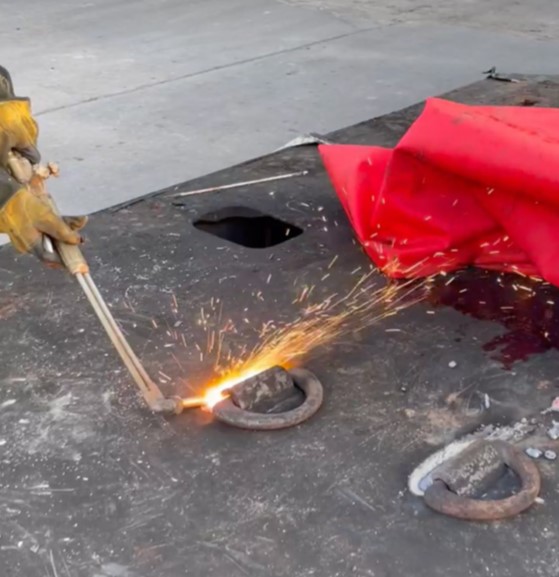American P&I Club: Fire Started from cutting torch work
The excellent American P&I Club “Good Catch” safety briefing series has published a briefing on a fire that started as a result of hot work.
What happened?
Crew members on a general cargo vessel in port were using an oxy-acetylene torch to remove various sea fastenings in a cargo hold. The hot work permit required fire blankets to be used and a fire watch. Fire blankets were placed around the work and were moved as the cutting operation progressed. As crew members were moving the fire blankets to the next work location, flames and smoke were seen from the cargo located on the tank top directly under the tween deck pontoons. The officer on watch was notified and sounded the general alarm. The crew members quickly evacuated the cargo hold. The crew was able to extinguish the fire, however, much of the cargo was damaged. Nearly $400,000 of damage was done to the cargo and the vessel itself.

What went right?
- A safety briefing was held prior to the start of the work;
- A hot work permit was obtained and reviewed by the crew involved in the work;
- The fire was discovered early, and the crew were able to quickly exit the cargo hold;
- The crew responded in a timely and professional way, saving much worse damage from otherwise occurring.
What went wrong?
Investigation determined that sparks and molten slag from the hot work had fallen through the gaps between the tween deck pontoons. The molten slag had also burned through the fire blanket and had fallen through the gap at several locations. The sparks and molten slag had landed on and ignited the plastic covering and protecting the cargo. Some of the cargo was damaged from the fire and other cargo was damaged by the smoke.
A review of the approved hot work permit indicated that while it specified the use of fire blankets in general terms, it did not specify a minimum required distance from the hot work or additional protective covering for cargo that may be exposed. More importantly, the permit did not address the specific risk from the hot work to the cargo located on the tank top under the tween deck pontoons.
Lessons to learn
- Hot work permits should be very specific to the exact risks associated with the specific hot work, specific location, specific time, and specific hazards;
- Fire watches are critically important during hot work to prevent fires. To be effective, the fire watch must be vigilant to the potential of fire in all the adjacent areas;
- Screens, shielding and fire blankets should be effectively placed to contain sparks and molten slag produced by hot work;
- Hot work permits should specifically address risks to all nearby cargo or any other flammable materials that may be exposed including the need for additional protective covers.
Members may wish to refer to:
Safety Event
Published: 1 April 2022
Download: IMCA SF 08/22
IMCA Safety Flashes
Submit a Report
IMCA Safety Flashes summarise key safety matters and incidents, allowing lessons to be more easily learnt for the benefit of all. The effectiveness of the IMCA Safety Flash system depends on Members sharing information and so avoiding repeat incidents. Please consider adding [email protected] to your internal distribution list for safety alerts or manually submitting information on incidents you consider may be relevant. All information is anonymised or sanitised, as appropriate.
IMCA’s store terms and conditions (https://www.imca-int.com/legal-notices/terms/) apply to all downloads from IMCA’s website, including this document.
IMCA makes every effort to ensure the accuracy and reliability of the data contained in the documents it publishes, but IMCA shall not be liable for any guidance and/or recommendation and/or statement herein contained. The information contained in this document does not fulfil or replace any individual’s or Member's legal, regulatory or other duties or obligations in respect of their operations. Individuals and Members remain solely responsible for the safe, lawful and proper conduct of their operations.
